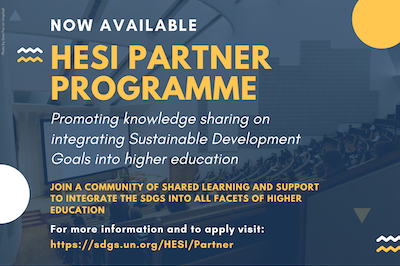Education
Description
Education for all has always been an integral part of the sustainable development agenda. The World Summit on Sustainable Development (WSSD) in 2002 adopted the Johannesburg Plan of Implementation (JPOI) which in its Section X, reaffirmed both the Millennium Development Goal 2 in achieving universal primary education by 2015 and the goal of the Dakar Framework for Action on Education for All to eliminate gender disparity in primary and secondary education by 2005 and at all levels of education by 2015. The JPOI addressed the need to integrate sustainable development into formal education at all levels, as well as through informal and non-formal education opportunities.
There is growing international recognition of Education for Sustainable Development (ESD) as an integral element of quality education and a key enabler for sustainable development. Both the Muscat Agreement adopted at the Global Education For All Meeting (GEM) in 2014 and the proposal for Sustainable Development Goals (SDGs) developed by the Open Working Group of the UN General Assembly on SDGs (OWG) include ESD in the proposed targets for the post- 2015 agenda. The proposed Sustainable Development Goal 4 reads "Ensure inclusive and equitable quality education and promote life-long learning opportunities for all" and includes a set of associated targets.
ESD is closely tied into the international discussions on sustainable development, which have grown in scale and importance since, Our Common Future appeared in 1987, providing the first widely-used definition of sustainable development as the "development that meets the needs of the present without compromising the ability of future generations to meet their own needs."
The crucial role of education in achieving sustainable development was also duly noted at the United Nations Conference on Environment and Development, held in Rio de Janeiro in 1992, through Chapter 36 of its outcome document - Agenda 21.
The importance of promoting education for sustainable development and integrating sustainable development actively into education was also emphasized in paragraph 233 of the Future We Want, the outcome of the United Nations Conference on Sustainable Development, Rio+20, in 2012.
In 2005, UNESCO launched the United Nations Decade of Education for Sustainable Development which reaffirmed the key role of education in shaping values that are supportive of sustainable development, and in consolidating sustainable societies. The final report of the UN Decade of Education for Sustainable Development, Shaping the Future We Want, was launched at the UNESCO World Conference on Education for Sustainable Development, held in November 2014, Nagoya, Japan.
In the run-up to the United Nations Conference on Sustainable Development, Rio+20, the Higher Education Sustainability Initiative (HESI) was created as a partnership of several sponsor UN entities (UNESCO, UN-DESA, UNEP, Global Compact, and UNU) aiming at galvanizing commitments from higher education institutions to teach and encourage research on sustainable development, greening campuses and support local sustainability efforts. With a membership of almost 300 universities worldwide, HESI accounts for more than one-third of all the voluntary commitments that came out of the Rio +20 Conference, providing higher education institutions with a unique interface between policy making and academia.

Higher Education Sustainability Initiative
The Higher Education Sustainability Initiative (HESI) provides higher education with an interface between higher education, science, and policy making by raising the profile of higher education’s sector in supporting sustainable development
Read more
HESI Partner Programme
Connecting higher education institutions, networks, and student organizations to create a community of shared learning in support of SDG integration
Read morePagination
| Title | Category | Date Sort ascending |
|---|---|---|
| Caribbean Community (CARICOM) | Health and population dynamics; Education and life-long learning | 5-May-2014 |
| Group of 77 and China | Health and population dynamics; Education and life-long learning | 5-May-2014 |
| Bhutan, Thailand and Viet Nam | Health and population dynamics; Education and life-long learning | 5-May-2014 |
| Uruguay | Poverty eradication; Sustainable agriculture, food security, and nutrition | 5-May-2014 |
| Romania | Health and population dynamics; Education and life-long learning | 5-May-2014 |
| Jordan | Health and population dynamics; Education and life-long learning | 5-May-2014 |
| Pacific Small Island Developing States (PSIDS) | Health and population dynamics; Education and life-long learning | 5-May-2014 |
| Japan | Health and population dynamics; Education and life-long learning | 5-May-2014 |
| Canada, Israel and United States of America | Health and population dynamics; Education and life-long learning | 5-May-2014 |
| Poland | Health and population dynamics; Education and life-long learning | 5-May-2014 |
| Australia, The Netherlands and United Kingdom | Health and population dynamics; Education and life-long learning | 5-May-2014 |
| Iran | Health and population dynamics; Education and life-long learning | 5-May-2014 |
| Palau | Health and population dynamics; Education and life-long learning | 5-May-2014 |
| Denmark, Ireland and Norway | Health and population dynamics; Education and life-long learning | 5-May-2014 |
| Southern Africa Region | Health and population dynamics; Education and life-long learning | 5-May-2014 |
Pagination
Milestones
-
January 2000 Dakar Framework for Action on Education for AllThe Dakar Framework of Action, Education for All: Meeting our Global Commitments was adopted at the World Education Forum held in Dakar in 2000. The event represented the first opportunity at international level to observe and assess the results achieved by the Education for All Initiative. The Dakar Framework for Action itself is based on the most extensive evaluation of education ever undertaken: the Education for All (EFA) 2000 Assessment. Called for by the World Conference of Education for All, the Assessment produced a detailed analysis of the state of basic education around the world. Each country assessed its progress towards the goals of Jomtien and reported its findings at six consecutive regional conferences held in 1999 and 2000. The six regional EFA frameworks adopted at these conferences represent an integral part of the Framework for Action, and became therefore part of the document.
-
January 1992 Agenda 21 (Chap. 36)The crucial role of education in achieving sustainable development was also duly noted at the United Nations Conference on Environment and Development, held in Rio de Janeiro in 1992, through Chapter 36 of its outcome document - Agenda 21. Paragraph 3 of Chapter 36 reads:"Education is critical for promoting sustainable development and improving the capacity of the people to address environment and development issues. While basic education provides the underpinning for any environmental and development education, the latter needs to be incorporated as an essential part of learning".
-
January 1990 World Decl. on EFAThe World Declaration on Education for All was adopted during the World Conference on Education for All in Jomtien, Thailand in 1990. On that occasion, delegates from 155 countries, as well as representatives from some 150 governmental and non-governmental organizations, agreed to make primary education accessible to all children and to massively reduce illiteracy before the end of the decade. The Declaration reaffirmed the notion of education as a fundamental human right and urged countries to intensify efforts to address the basic learning needs of all by the year 2000. The goals included: universal access to learning; a focus on equity; emphasis on learning outcomes; broadening the means and the scope of basic education; enhancing the environment for learning; and strengthening partnerships by 2000.
Pagination
- Previous page
- Page 2




